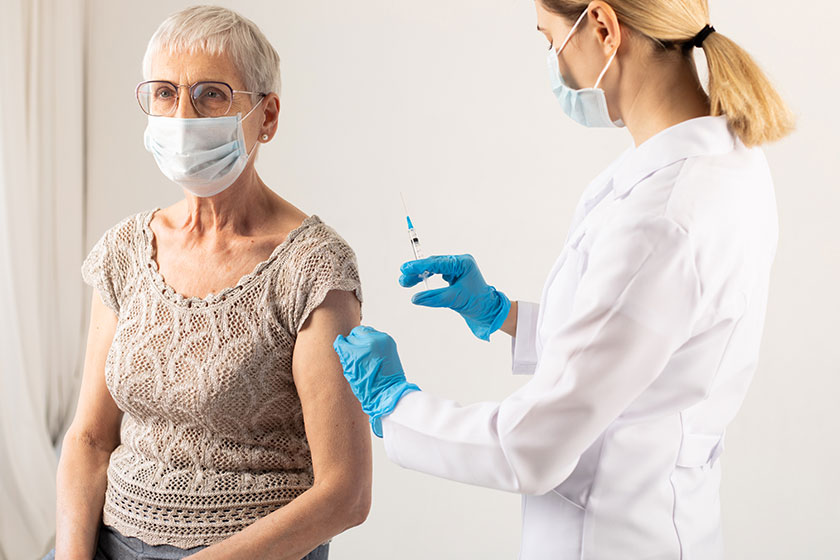As we age, our immune systems tend to weaken, making us more vulnerable to infections. One key preventive step is staying up to date with vaccinations. If you’re wondering about the pneumonia vaccine for seniors and how often it’s needed, this guide will help clarify the recommended schedule to help protect against severe respiratory infections and safeguard you or your loved one’s health.
Why Older Adults Need the Pneumonia Vaccine
Pneumonia is a serious lung infection that can be life-threatening, especially for older adults. The risk of complications from pneumonia is higher for people above the age of 65, as their immune systems may not respond as well to infections. This makes preventive measures, like vaccinations, a vital part of maintaining their overall health and wellness.
Vaccines help your body build protection against specific germs and in the case of pneumonia, they can significantly reduce your risk of contracting a severe form of the illness. While the vaccine doesn’t guarantee complete immunity, it lowers your chances of serious complications, which is especially important for older adults.
Types of Pneumonia Vaccines for Older Adults
There are two main types of pneumonia vaccines recommended for older adults:
PCV13/PCV15/PCV20: This vaccine helps protect against a specific group of bacteria known as Streptococcus pneumoniae. These bacteria can cause infections like pneumonia, meningitis and bloodstream infections. It is typically given first in the vaccination schedule.
PPSV23: This vaccine targets a broader range of bacteria, covering additional strains that can lead to severe illness. It is usually administered after the PCV vaccine.
Recommended Schedule for Older Adults
The Centers for Disease Control and Prevention (CDC) has outlined specific pneumococcal vaccination guidelines for adults aged 65 and older. The vaccine schedule varies based on prior vaccination history. Here’s how the timing works:
-
No Previous Pneumococcal Vaccines
If you haven’t received any pneumococcal vaccines, you can receive PCV20 as a single-dose option.
Alternatively, you can opt for PCV15, followed by PPSV23 at least 1 year later. For older adults with certain medical conditions, such as cochlear implants, immunocompromising conditions or cerebrospinal fluid leaks, you may need a shorter vaccination interval of 8 weeks between PCV15 and PPSV23.
-
Previously Received Only PPSV23 (at any age)
If you had only the PPSV23 vaccine at any age, you should receive PCV20 or PCV15 at least 1 year after your last PPSV23 dose.
-
Previously Received Only PCV13 (at any age)
If you had only the PCV13 vaccine at any age, you should receive PCV20 or PPSV23 at least 1 year after your last PCV13 dose.
For those with cochlear implants, immunocompromising conditions and cerebrospinal fluid leaks, the vaccination interval can be 8 weeks between PCV13 and PPSV23.
-
Completed Both PCV13 and PPSV23 (before age 65)
If you already had both PCV13 and PPSV23 before you turned 65, you should receive PCV20 or PPSV23 at least 5 years after your last PPSV23 dose.
Above all, it’s imperative to talk to your healthcare provider about your full vaccine history and current health status to determine the most appropriate vaccine schedule for you.
Who Should Get Vaccinated?
All adults aged 65 and older are encouraged to receive the pneumonia vaccine. However, certain factors may put some individuals at even higher risk for pneumonia, making vaccination even more crucial. These risk factors include:
- Chronic health conditions, such as heart disease, diabetes or lung disorders
- A weakened immune system, possibly due to medications or treatments like chemotherapy
- A history of smoking
- Long-term exposure to environments where infections are more likely to spread, such as hospitals or retirement communities
If any of these conditions apply to you, your doctor may recommend a more tailored vaccination schedule or additional vaccines to further lower your risk.
Side Effects and Safety of the Vaccine
Like any vaccine, the pneumonia vaccine can cause mild side effects, though serious reactions are rare. The most common side effects include soreness at the injection site, mild fever or muscle aches. These symptoms typically go away within a few days and are not usually a cause for concern.
If you experience more severe symptoms, such as difficulty breathing, a high fever or signs of an allergic reaction, seek medical attention right away. These reactions are extremely uncommon, but it’s important to stay alert and consult your healthcare provider if anything feels unusual after your vaccination.
Overall, the pneumonia vaccine is considered very safe and is recommended by leading health organizations as a preventive measure for older adults.
Take Action Today
Don’t wait till the cold and flu seasons to think about pneumonia vaccinations for yourself or a loved one. Get ahead of the potential infections now to give yourself the best chance of avoiding grave complications. Your health is a priority and staying on top of preventive care is an essential step in enjoying your golden years to the fullest.







